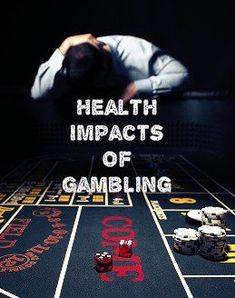
Gambling has been a popular form of entertainment for centuries. From card games to betting on sports events, the allure of potentially winning big has captivated people worldwide. However, behind the glitz and glamour lies a dark side that often goes unnoticed – the impact of gambling on mental health.
While gambling may seem like a harmless recreational activity to some, it can have significant consequences on individuals’ mental well-being. Understanding the connection between gambling and mental health is crucial for both individuals seeking help and society as a whole.
The Destructive Domino Effect
For many people, gambling starts as a source of excitement and the thrill of taking risks. However, for some, it can quickly spiral out of control and lead to a vicious cycle that adversely affects their mental health.
The intense urge to gamble, also known as compulsive gambling or gambling addiction, can lead to a plethora of psychological issues. With each loss, individuals may experience feelings of frustration, guilt, shame, and hopelessness. These negative emotions can further fuel the cycle, as individuals resort to more gambling to numb their distress.
Depression and Anxiety: Common Comorbidities
Gambling addiction often coexists with other mental health disorders, such as depression and anxiety. The thrill of gambling can temporarily alleviate symptoms of depression, providing individuals with a false sense of relief.
However, as the addiction worsens and finances become jeopardized, the consequences become overwhelming. The mounting debt, strained relationships, and legal issues further exacerbate existing mental health conditions, leading to a downward spiral of depression and anxiety.
Unmasking the Stigma: Seeking Help
One of the biggest challenges surrounding gambling addiction and mental health is the prevailing stigma. Many individuals hesitate to seek help due to fear of judgment or societal misconceptions.
However, it is essential to recognize that gambling addiction is a legitimate mental health concern. It is not a reflection of weak willpower or character flaws. Like any other addiction, it requires proper understanding, support, and professional treatment.
By unmasking the stigma and encouraging open conversations about gambling addiction and mental health, individuals can feel more empowered to seek help, reducing the detrimental impact on their overall well-being.
Prevention and Support: A Holistic Approach
Addressing the connection between gambling and mental health requires a multi-faceted approach. Prevention efforts should focus on raising awareness about the risks of gambling addiction and promoting responsible gambling practices.
Educating individuals about the signs of gambling addiction and providing resources for early intervention can significantly reduce the prevalence of mental health issues associated with gambling.
Furthermore, building a robust support system is crucial in helping those already struggling with gambling addiction. Offering accessible treatment options, counseling services, and support groups can provide individuals with the necessary tools to overcome their addiction and rebuild their lives.
Conclusion
Gambling and mental health are undeniably interconnected. While gambling may initially appear harmless, it can quickly escalate into a destructive force that wreaks havoc on an individual’s mental well-being.
By recognizing the connection, destigmatizing gambling addiction, and implementing comprehensive prevention and support measures, we can minimize the negative impact on individuals’ mental health. Together, we can create a society that promotes responsible gambling practices and prioritizes the well-being of its members.

